A New York man who was left paralyzed after a diving accident is starting to regain movement a year after receiving an artificial intelligence-powered implant in his brain.
A year ago, Keith Thomas, 46, was only able to move his arms an inch. Today, after the groundbreaking procedure, he is able to extend his arm, grasp a cup and take a drink using only his thoughts and stimulation.
He has also regained more sensation in his wrist and arm, allowing him to feel the fur of his family’s dog.
JOHNNY DEPP VISITS CHILDREN’S HOSPITAL DRESSED AS CAPTAIN JACK SPARROW IN ‘MAGICAL MOMENT’
In 2020, Thomas was living on Long Island and working as a trader on Wall Street when he experienced a diving accident that left him paralyzed from the chest down.
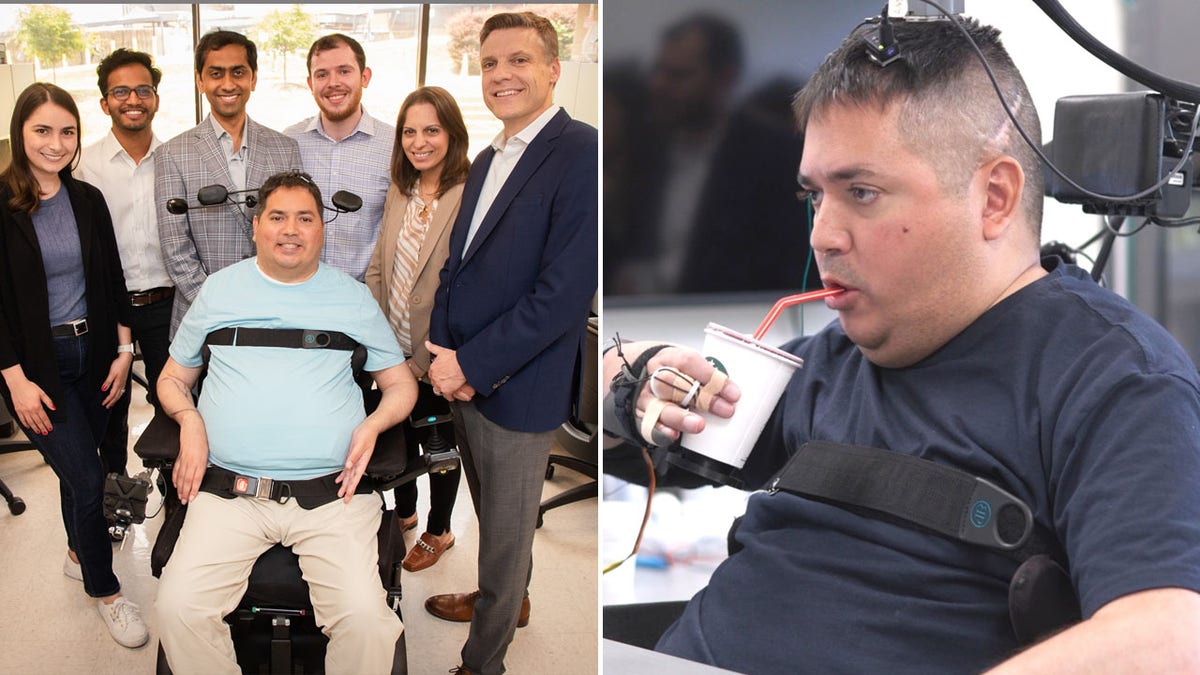
A New York man (Keith Thomas, right) who was left paralyzed after a diving accident is starting to regain movement a year after receiving an artificial intelligence-powered implant in his brain. Thomas is pictured at left with his care team. (Feinstein Institutes for Medical Research at Northwell Health)
“I dove into a swimming pool at a friend’s house between the shallow and deep end,” he told Fox News Digital. “I hit the bottom and broke my neck. I blacked out, and I couldn’t move.”
Thomas recalls getting loaded into a helicopter that took him to the hospital for the start of his long recovery.
“It was during COVID, so it was extremely difficult and isolating.”
A ‘groundbreaking’ procedure
A year ago, Thomas could only move his arms an inch. But in 2023, he underwent a grueling 15-hour surgery, during which the first AI-powered double neural bypass implant was placed in his brain at Feinstein Institutes for Medical Research at Northwell Health in New York.
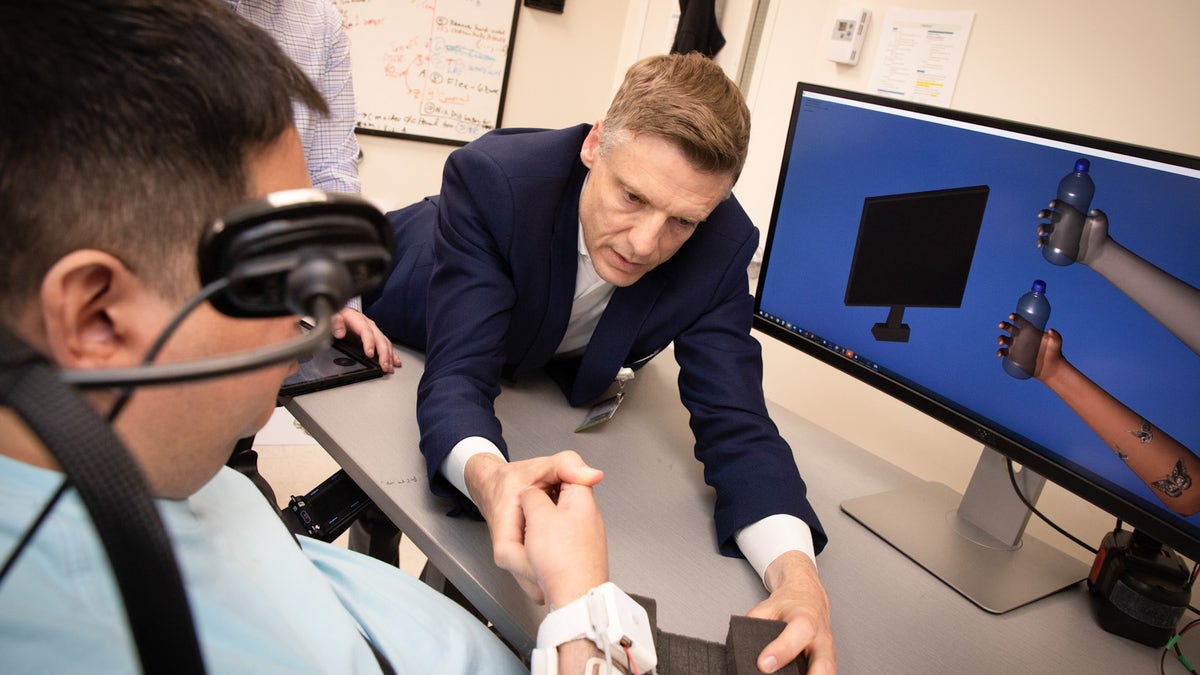
Prof. Chad Bouton (right), the study’s principal investigator, works in his lab at The Feinstein Institutes for Medical Research to restore lasting movement and feeling in the arm and hand of Keith Thomas (left), who was paralyzed in an accident in 2020. (Northwell Health’s The Feinstein Institutes for Medical Research)
“This groundbreaking clinical trial marks the first time the brain, body and spinal cord have been electronically linked in a paralyzed human to restore lasting movement and sensation,” Chad Bouton, the study’s principal investigator and professor in the Institute of Bioelectronic Medicine at the Feinstein Institutes, told Fox News Digital.
AI FAST-TRACKS DEMENTIA DIAGNOSES BY TAPPING INTO ‘HIDDEN INFORMATION’ IN BRAIN WAVES
The surgical team, led by neurosurgeon Dr. Ashesh Mehta at Northwell Health, implanted five microchips in Keith’s brain — two in the region responsible for movement and three that control the sensation of touch.
“These microchips connect to two ports implanted in his skull, which are linked to a powerful computer running custom AI that we developed to read Keith’s brainwaves and determine when he wants to move his hand,” Bouton said.
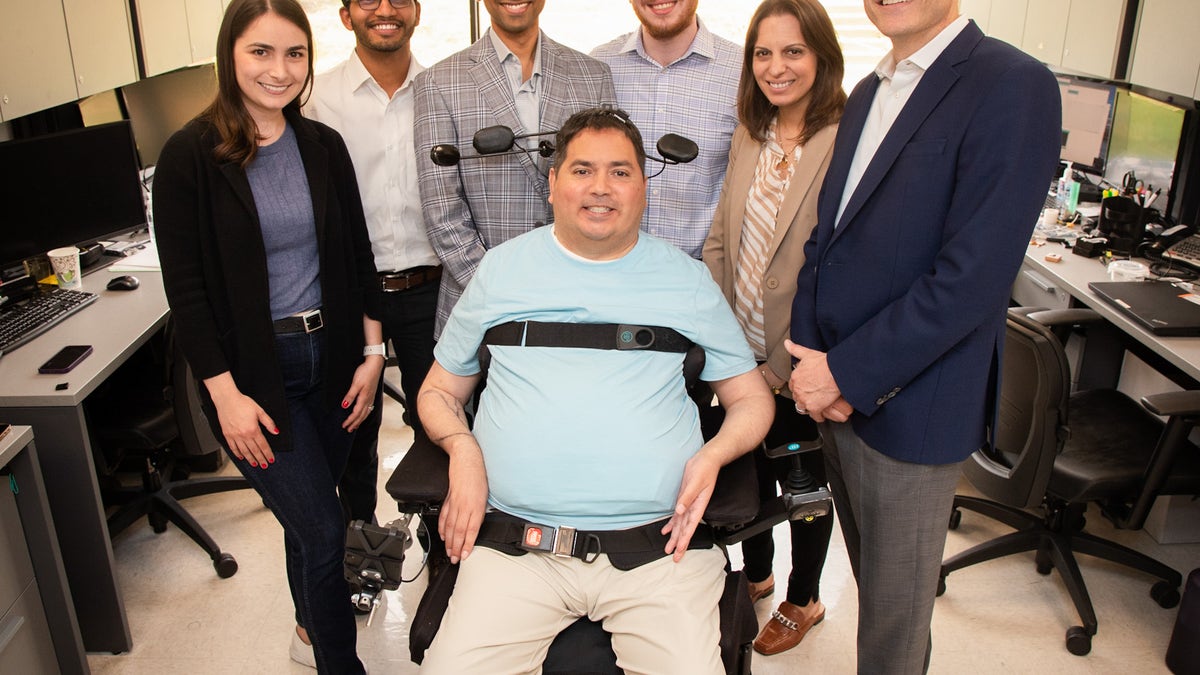
Keith Thomas, who lives with paralysis, poses with the research team at Northwell Health’s Feinstein Institutes for Medical Research who worked with him for months to restore lasting movement and feeling in his arm and hand. (Northwell Health’s The Feinstein Institutes for Medical Research)
Based on thoughts, the device – called a “double neural bypass” – reroutes signals around his injury between his brain and body, the doctor detailed.
“The double neural bypass technology also stimulates his muscles, brain and spinal cord, all based on his brain patterns, and promotes lasting recovery of movement and sensation.”
“Keith’s brain, body and spinal cord are re-learning how to work together once again.”
The surgery required Thomas to be awake at one point to ensure the precise placement of the microchips in his brain.
“It was a little fuzzy, but I remember hearing someone ask me if I felt something, and I felt a tingle in certain part of my hand,” Thomas recalled.
Three major milestones
After the surgery, Thomas has regularly returned to the lab at Feinstein Institutes, where the team is monitoring his progress and conducting a clinical trial of the results.
“Once I was out of surgery and saw the improvements during lab sessions, it was incredible,” he said. “I was speechless.”
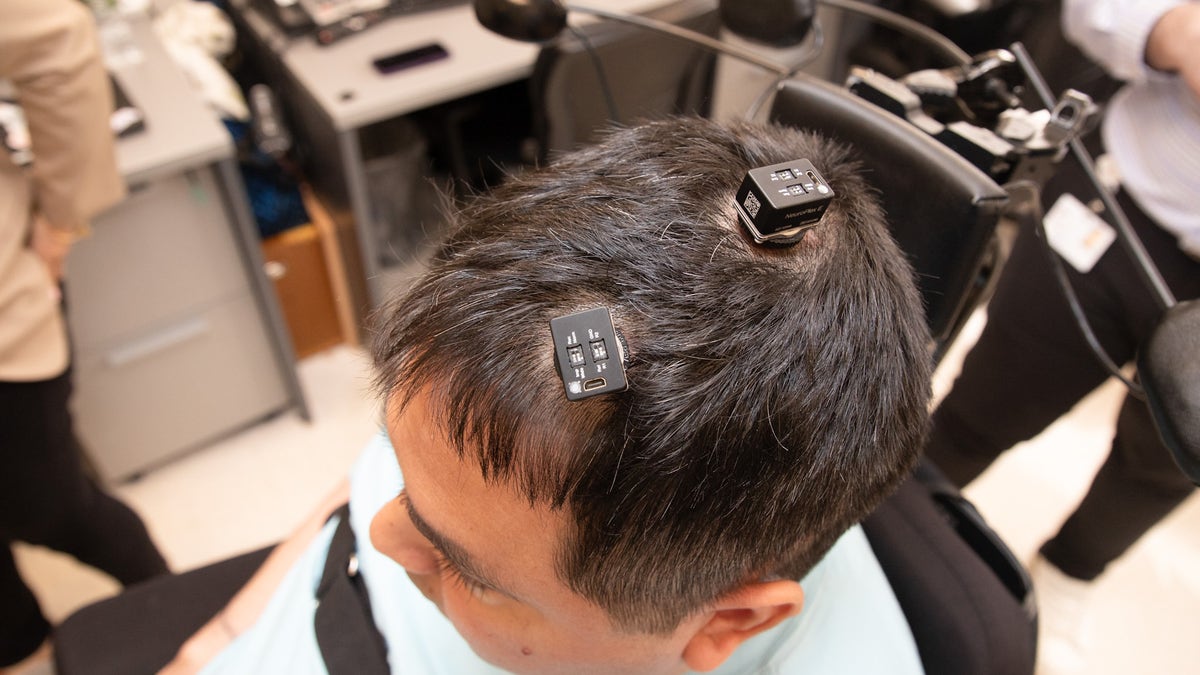
Keith Thomas, who lives with paralysis, had five tiny microchips implanted in his brain, forming a critical portion of a first-of-its-kind “double neural bypass.” The technology uses artificial intelligence to decode and translate his thoughts into action. (Northwell Health’s The Feinstein Institutes for Medical Research)
Thomas has reached three major milestones, exceeding the team’s expectations.
“First, only a few months after surgery, Keith felt the touch of his sister’s hand for the first time in three years since his accident,” Bouton said. “There was not a dry eye in the lab at that moment.”
Second, Keith doubled his arm strength over the course of the study, which is not usually possible three years after a major spinal cord injury, the doctor said.
SPINAL CORD TREATMENT RESTORES FUNCTION FOR PARALYZED PATIENTS IN STUDY: ‘NEW HOPE’
“Lastly, with his regained arm strength and sensation, Keith was recently able to feel and lift a cup of tea to his mouth, and take a drink, without any help and using his thoughts alone,” Bouton shared.
“This was an amazing moment and what we’ve been working for during these past few years.”
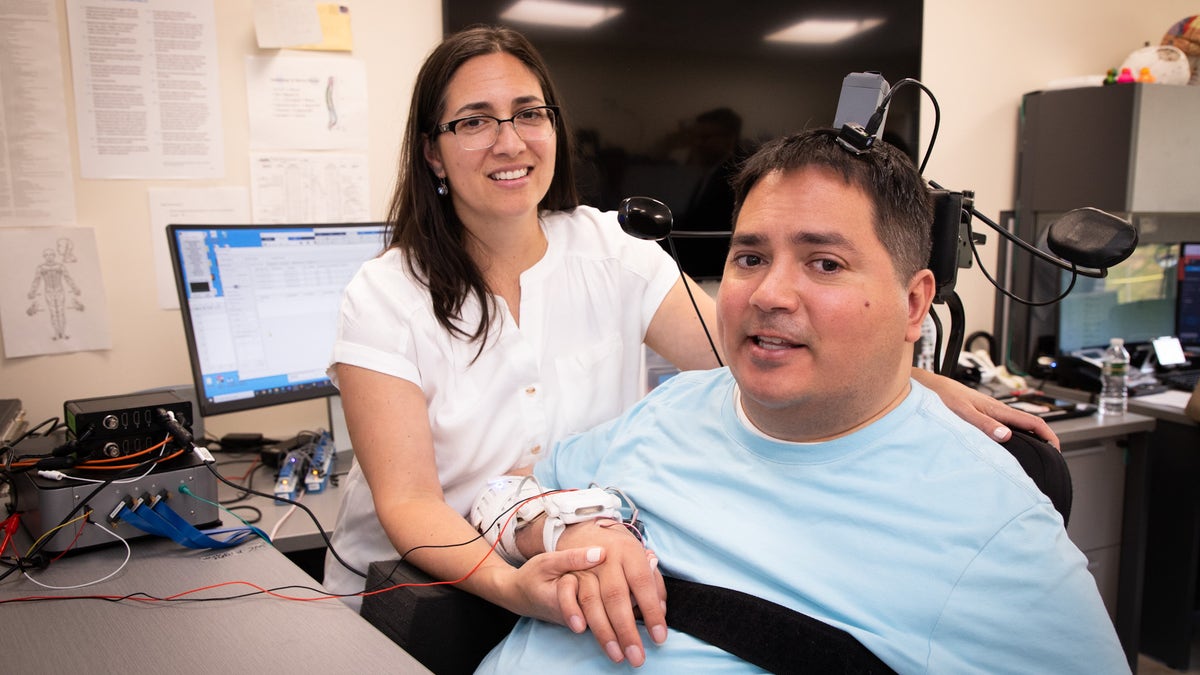
Keith Thomas is able to feel his sister hold his hand for the first time since a diving accident in 2020 left him paralyzed from the chest down. (Northwell Health’s The Feinstein Institutes for Medical Research)
Thomas has also regained sensation in areas that are below his injury level, such as his wrist, even outside the lab.
“This suggests that Keith’s brain, body and spinal cord are re-learning how to work together once again, and some connections are being strengthened,” Bouton said.
CLICK HERE TO GET THE FOX NEWS APP
Thomas described his own progress as “mind-boggling.”
“Every day, I feel like we are accomplishing more and more.”
Looking ahead
The goal is for Thomas to continue to gain more movement and sensation outside the lab, and he hopes to one day drive his own motorized wheelchair without assistance.

After joining a clinical trial at Northwell Health’s Feinstein Institutes for Medical Research that uses brain implants and artificial intelligence to reconnect his brain with healthy parts of his spinal cord, Thomas has continuously improved, restoring lasting movement and feeling in his arm and hand. (Northwell Health’s The Feinstein Institutes for Medical Research)
Added Thomas, “I want to continue making progress to live a more independent life – and if I can inspire others to sign up for a clinical trial or help someone else through this trial, that’s all I want.”
Bouton said he and the team are “optimistic” that Keith will continue to improve over time as he uses the double neural bypass technology.
CLICK HERE TO SIGN UP FOR OUR HEALTH NEWSLETTER
“We are continuing to monitor his progress in terms of sensation and movement recovery,” he said.
“Our team has also received approval to expand our clinical trial, and we are actively seeking new participants.”
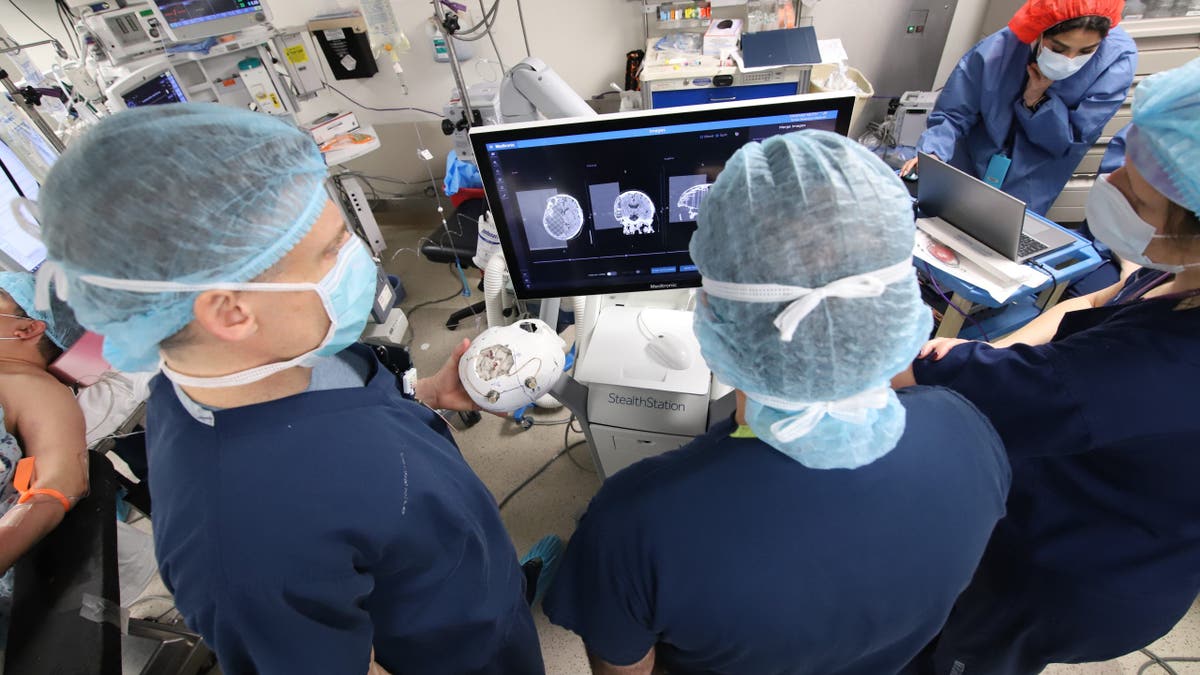
The Feinstein Institutes for Medical Research’s Prof. Chad Bouton (left) and Dr. Ashesh Mehta led teams of doctors and scientists to implant brain electrodes, which restored lasting movement and sensation in a man living with paralysis. (Northwell Health’s The Feinstein Institutes for Medical Research)
Bouton said he believes that AI has significant potential to improve outcomes for paralyzed patients.
“AI is already changing how medicine is being practiced today, but we believe our work in combining AI with brain-computer interface technology will revolutionize the treatment of paralysis and many other conditions in the future,” he said.
For more Health articles, visit www.foxnews.com/health
“Our goal is to one day utilize this technology to empower individuals with paralysis to regain more function and live more independent lives.”



